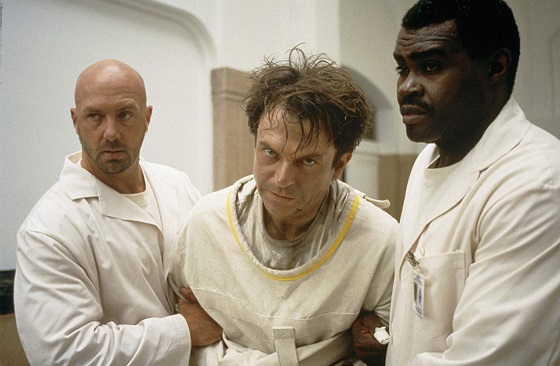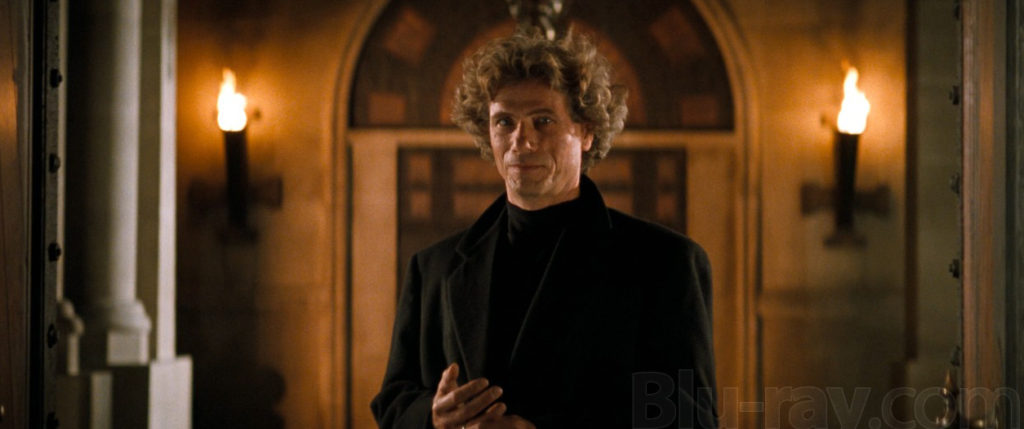In the Mouth of Madness is a gateway to Sam Neil, and for that the film instantly wins praise. Many, of course, discovered the Kiwi kook through his leading turn in Jurassic Park, others perhaps even earlier via Dead Calm. But, for some of us, it was the one-two of this shlock horror caper, followed by 1997’s space hokum, Event Horizon, that forged an undying devotion to the man.
Here he plays freelance insurance investigator, John Trent, hired by a publishing company to hunt down a missing bestselling author, Sutter Cane – and the valuable, overdue manuscript for his latest novel. Trent’s investigations soon lead him to believe that a highly sophisticated publicity scam is underway, and he hits the road in search of the truth.
Watching the movie again is a relief: it hasn’t lost its appeal. There remains a hell of a lot to like.
Nihilist Neil
Sam Neill’s character is set up nicely at the beginning – a job Carpenter hardly bothers with in his later efforts. Trent is deeply cynical, proud, funny and crucially hard to spook. The script, by Michael DeLuca (who also wrote the story for the Stallone Judge Dredd – not so good) pulls a nice trick by establishing Trent’s determination to expose what he believes is an elaborate publicity stunt.
This, combined with Trent’s dogged character, means we don’t get annoyed with him for ignoring some rather striking forewarnings of imminent peril. Instead we can relax and enjoy the company of a guy who openly states about humanity: “the sooner we’re off the planet the better”. Neill is a delightful companion as we drive off the map.
Suffering Sam
As the town of Hobb’s End closes about him and Trent begins to sense something deeply wrong at work, Sam gets to show us another side of his acting chops: that of a man coming apart. There is great joy in watching him wake up screaming in a blue world, or laugh and cry at the movie of his life played out on screen. It makes his defiance in the most crucial moments (“anyway your books suck”) more impressive, his fall more sympathetic. It’s a damn good thing this guy’s on board, with solid support from the likes of David Warner, Charlton Heston and Julie Carmen, because without him things begin to look a little wobbly.
Uneven effects
When the lights are low enough and the timing is right, JC still gives the late night viewer the heebie-jeebies. The white haired bike ghoul, emerging from the night; the obscene painting in Trent’s hotel; the horror girl telling Julie Carmen: “You’re my mummy”. All good nasty stuff.
But on the whole the scares are hit and miss, with failing jumps and a reliance on “crusty-lump face” make-up: Neill waking up next to a Zombie cop is more laugh than fright; and the excellent Frances Bay is more chilling as polite old lady treading on her naked, prone husband than as a sticky, writhing Carpenter monster. The horror that shapes Hobb’s End is disjointed and hazily defined, when it should be meticulously plotted by Cane. And it’s Cane that’s the movie’s main problem.
Prochnow Perm
Jurgen Prochnow is well loved for his Boot captains and his Beverly bad guys, and though fun enough he is poorly served by absurd hair and too little meat on which to gnaw. The object of the quest will always have to work very hard to live up to our expectations, but the explanation of who and what he is, beyond a twinkly-eyed hound-master with a penchant for vampire dress, is unsatisfying.
Sutter Cane is supposed to be “a deadly mad prophet of the printed page”, the writer who has transformed fiction into religion, but he has few lines, and the good ones there are (“for years I thought I was making all this up”) hint at a better Hobb’s End sequence than we get, that better illustrates Cane’s imaginative landscape.
Printed power
You might think that the story’s theme – of the printed page having the power to drive society insane – could make the movie a quaint experience, when watched in our Netflix age. However, even now printed fiction retains a distinct immersive experience that television and even video games struggle to replicate. We might still reasonably propose that a book has a greater potential to alter and transport minds than the moving image.
Yes, it is a longer, more subtle, harder worked journey to enter a story through the written word, but once we’re in the effect is more complete, and one we experience alone. Trent says that we are “flushing our brains down the toilet” when we read popular fiction – but now more than ever this seems a little unfair. The endless scrolling through Netflix is the real brain death. Say what you like about Cane’s followers, their madness really makes you think.

